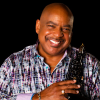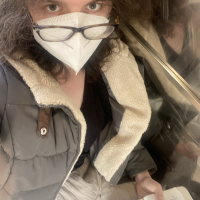Home » Jazz Musicians » Jimmy Giuffre
Jimmy Giuffre
Reedman and composer Jimmy Giuffre was born in Dallas, TX. He started his musical education at age 9 learning the clarinet and within few years he was proficient enough to give solo clarinet recitals at local functions. After high school he attended North Texas State University receiving a B. A. in music. During his college years he played in local bands. Soon after graduation he enlisted in the Army and was a member of the official Army band. After discharge he became a professional arranger for several big bands including Boyd Raeburn's, Buddy Rich's, Jimmy Dorsey’s and most famously in Woody Herman’s where he also played tenor sax. During his tenure with Woody Herman’s big band he composed the classic “Four Brothers” in 1947.
In the early 1950s Jimmy Giuffre moved to LA and studied for a while at UCLA and played with the bands of Shorty Rogers and Howard Rumsey. He also added baritone sax to his repertoire. He was introduced by one of his colleagues to music teacher, poet and composer Dr. Wesley La Violette. From the later he learned the concept of classical counterpoint; a linear style of composing that freed one of chord structures.
From 1954-1958, Jimmy Giuffre recorded several classic albums for Capital and Atlantic including the 1956 landmark record Clarinet. His, unusual for the time, groups were drummerless/pianoless trios initially with Jim Hall on guitar, and Ralph Pena on bass and then with Jim Hall and valve trombonist Bob Brookmeyer, creating an unusual lineup for its time. The first incarnation of the trio appeared participated on KABC "Stars of Jazz" tv show where he met his future wife. In the late 50s his trio changed format and he replaced the guitar with Paul Bley's piano and the valve trombone with Steve Swallow’s bass. From this trio comes the 1962 classic Free Fall. This album also marked a transition in his musical style from what he had called "blues-based folk jazz" to a new free jazz. His trio changed personnel again in the mid 1960s with Don Friedman at the piano and Barry Phillips on bass.
Late 60s brought another innovation to Jimmy Giuffre's music: the introduction of drums with the percussionist Randy Kay. His clarinet, bass drum trio recorded a few albums of the introspective and free jazz music he had started composing.
In the 1970s he moved to the east coast and taught at New York University, Rutgers, the New School of Social Research and the New England Conservatory. In order to supplement his income he also composed music for theatre, dance companies, films and TV commercials and also acted as a hand model in some of the commercials.
Read moreTags
The Jimmy Giuffre 3: Music for People, Birds, Butterflies & Mosquitoes

by Joshua Weiner
Has any musician who is not a pianist explored the trio as a basis for musical invention as thoroughly as Jimmy Giuffre? There have been many versions of the Jimmy Giuffre 3, from the initial 1950s unit with Jim Hall on guitar and either Ralph Peña on bass or Bob Brookmeyer on valve trombone, through the truly remarkable band featuring Steve Swallow on bass and Paul Bley on piano (ECM's reissue of two Verve LPs on the 1961 set is ...
Continue ReadingThe Easy Way

by Richard J Salvucci
It is fair to wonder how Jimmy Giuffre would be remembered had he not gone off on to the wilder shores of atonality, collective improvisation, and free jazz with Paul Bley and Steve Swallow in the early 1960s. It is easy to forget that Giuffre was regarded as a rising star, both as a multi-instrumentalist (he played tenor and baritone sax; clarinet was apparently a double for him) and a composer, in the 1950s. Yes, mentioned in the same breath ...
Continue ReadingJimmy Giuffre: Free Fall Clarinet 1962 Revisited

by Alberto Bazzurro
Cosa scrivere, ancora, di un capolavoro assoluto, che magari chi legge conosce quanto e meglio di chi scrive, un disco che personalmente annovereremmo fa i tre massimi di quello straordinario, originalissimo musicista che fu Jimmy Giuffre, con Clarinet e Western Suite (o se preferite, di analogo contesto e periodo, Four Brothers Sound)? Per esempio quali sensazioni ha destato questo nuovo ascolto, dopo i numerosi precedenti, ma con in mezzo un intervallo di tempo che ci ha fatto percepire come nuovi ...
Continue ReadingThe Legacy of Jimmy Giuffre and Lennie Tristano (1961 - 1969)

by Russell Perry
Clarinetist Jimmy Giuffre and pianist Lennie Tristano were heavily influential in the musical explorations of the 1960s. The Jimmy Giuffre Trio recorded a series of records in the early 1960s now seen as significant milestones in improvisational music, although they made no commercial impact at the time. His trio-mates-- pianist Paul Bley and bassist Steve Swallow--have been major players in the decades since. Lennie Tristano dropped out of sight in 1960, but his protégés Lee Konitz and Warne Marsh carried ...
Continue ReadingEmanem Tidies Up

by John Eyles
As well as releasing contemporary recordings of improv, Martin Davidson's Emanem label has played a vital role in documenting the history of the music by releasing, re-releasing or re-curating recordings that are decades old. In the process, Davidson has sometimes worked tirelessly to improve the sound quality of recordings that were never intended for release, and has been relentless in his pursuit of vital recordings that plugged gaps in the discographies of important musicians. In a 2001 interview, Derek Bailey ...
Continue ReadingJimmy Giuffre 3 & 4: New York Concerts

by Giuseppe Segala
Documento di importanza storica, portato alla preziosa pubblicazione dalla tenacia del produttore Zev Feldman che lo ha rinvenuto nel 2012 nell'archivio di George Klabin, presidente dell'etichetta Resonace Records, New York Concerts rimedia a una lacuna nella produzione di Jimmy Giuffre e nel contempo dà modo di ascoltare alcune tra le sue musiche più significative. A renderle indispensabili basterebbe il fatto che queste registrazioni, riunite in un CD doppio, effettuate dal vivo nel 1965 per trasmissioni radiofoniche dallo stesso Klabin, allora ...
Continue ReadingJimmy Giuffre: New York Concerts

by Hrayr Attarian
Saxophonist and clarinetist Jimmy Giuffre was a first rate innovator who restlessly reinvented his art without losing its signature character. Despite leaving behind a large recorded legacy Giuffre remains far from being a household name known mostly in hardcore jazz aficionado circles. In 2012 producer Zev Feldman of Elemental Music came across two unreleased Guiffre tapes from 1965. Both were cut in New York at, now defunct, venues. Feldman was taken by the freedom of the music and ...
Continue ReadingJazz Musician of the Day: Jimmy Giuffre

Source:
Michael Ricci
All About Jazz is celebrating Jimmy Giuffre's birthday today!
Reedman and composer Jimmy Giuffre was born in Dallas, TX. He started his musical education at age 9 learning the clarinet and within few years he was proficient enough to give solo clarinet recitals at local functions. After high school he attended North Texas State University receiving a B. A. in music. During his college years he played in local bands. Soon after graduation he enlisted in the Army and was ...
read more
Jazz Musician of the Day: Jimmy Giuffre

Source:
Michael Ricci
All About Jazz is celebrating Jimmy Giuffre's birthday today!
Reedman and composer Jimmy Giuffre was born in Dallas, TX. He started his musical education at age 9 learning the clarinet and within few years he was proficient enough to give solo clarinet recitals at local functions. After high school he attended North Texas State University receiving a B. A. in music. During his college years he played in local bands. Soon after graduation he enlisted in the Army and was ...
read more
Jazz Musician of the Day: Jimmy Giuffre

Source:
Michael Ricci
All About Jazz is celebrating Jimmy Giuffre's birthday today!
Reedman and composer Jimmy Giuffre was born in Dallas, TX. He started his musical education at age 9 learning the clarinet and within few years he was proficient enough to give solo clarinet recitals at local functions. After high school he attended North Texas State University receiving a B. A. in music. During his college years he played in local bands. Soon after graduation he enlisted in the Army and was ...
read more
Jazz Musician of the Day: Jimmy Giuffre

Source:
Michael Ricci
All About Jazz is celebrating Jimmy Giuffre's birthday today!
Reedman and composer Jimmy Giuffre was born in Dallas, TX. He started his musical education at age 9 learning the clarinet and within few years he was proficient enough to give solo clarinet recitals at local functions. After high school he attended North Texas State University receiving a B. A. in music. During his college years he played in local bands. Soon after graduation he enlisted in the Army and was ...
read more
Jazz Musician of the Day: Jimmy Giuffre

Source:
Michael Ricci
All About Jazz is celebrating Jimmy Giuffre's birthday today!
Reedman and composer Jimmy Giuffre was born in Dallas, TX. He started his musical education at age 9 learning the clarinet and within few years he was proficient enough to give solo clarinet recitals at local functions. After high school he attended North Texas State University receiving a B. A. in music. During his college years he played in local bands... Read more.
Place our Musician of the Day widget on ...
read more
Jazz Musician of the Day: Jimmy Giuffre

Source:
Michael Ricci
All About Jazz is celebrating Jimmy Giuffre's birthday today!
Reedman and composer Jimmy Giuffre was born in Dallas, TX. He started his musical education at age 9 learning the clarinet and within few years he was proficient enough to give solo clarinet recitals at local functions. After high school he attended North Texas State University receiving a B. A. in music. During his college years he played in local bands... Read more.
Place our Musician of the Day widget on ...
read more
Jazz Musician of the Day: Jimmy Giuffre

Source:
Michael Ricci
All About Jazz is celebrating Jimmy Giuffre's birthday today!
Reedman and composer Jimmy Giuffre was born in Dallas, TX. He started his musical education at age 9 learning the clarinet and within few years he was proficient enough to give solo clarinet recitals at local functions. After high school he attended North Texas State University receiving a B. A. in music. During his college years he played in local bands... Read more.
Place our Musician of the Day widget on ...
read more
Video: Jimmy Giuffre Trio

Source:
JazzWax by Marc Myers
From 1957 to 1959, reed player Jimmy Giuffre led a revolutionary trio. It featured Giuffre on clarinet, tenor sax and baritone sax; guitarist Jim Hall; and a series of bass players, including Ralph Peña, Jim Atlas, Red Mitchell, Ray Brown and Wilfred Middlebrooks. Even Bob Brookmeyer took a turn at the piano and valve trombone. What made the jazz group special was its passion for Americana folk with a sophisticated spin. All members of the group were daredevil players—with Giuffre ...
read more
May 11: New England Conservatory Youth Jazz Orchestra In Music Of Jimmy Giuffre And Mary Lou Williams

Source:
Braithwaite & Katz Communications
The New England Conservatory Youth Jazz Orchestra conducted by Bob Nieske, features the music of Jimmy Giuffre and Mary Lou Williams in a free concert at 7:30 p.m. on Wednesday, May 11 at NEC’s Jordan Hall, 290 Huntington Avenue, Boston. The NEC Youth Jazz Orchestra is comprised of extraordinary middle and high school students from across the region. For more information, log on to NEC Youth Jazz or call 617-585-1260. The program for the evening includes Giuffre’s “Four Brothers,” “River ...
read more
Jazz Musician of the Day: Jimmy Giuffre

Source:
Michael Ricci
All About Jazz is celebrating Jimmy Giuffre's birthday today!
Reedman and composer Jimmy Giuffre was born in Dallas, TX. He started his musical education at age 9 learning the clarinet and within few years he was proficient enough to give solo clarinet recitals at local functions. After high school he attended North Texas State University receiving a B. A. in music. During his college years he played in local bands... Read more.
Place our Musician of the Day widget on ...
read more






















































